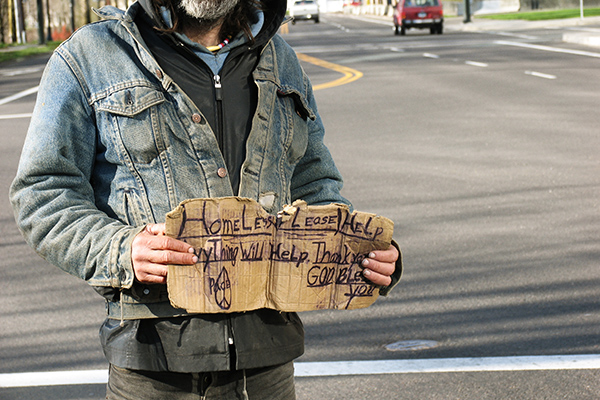by Matthew Smith
What do you get when you combine the compassion of social work with the science of data analytics?
That is the question University of North Carolina at Chapel Hill School of Social Work Associate Professor Hsun-ta Hsu is answering as part of his latest grant focused on rural homelessness from the National Alliance to End Homelessness.
 The $252,000 grant funds a two-year project based in Missouri that looks at the region’s current housing prioritization tool and examines its fairness and effectiveness with the input of community members. Housing prioritization tools collect information to assist housing agencies in placing people experiencing homelessness into permanent supportive housing.
The $252,000 grant funds a two-year project based in Missouri that looks at the region’s current housing prioritization tool and examines its fairness and effectiveness with the input of community members. Housing prioritization tools collect information to assist housing agencies in placing people experiencing homelessness into permanent supportive housing.
Hsu will lead two teams as part of the project. The first will work with local community stakeholders that have either worked with people who have experienced homelessness or have experienced homelessness themselves. The second will use data analytics to examine the current housing prioritization tool and see where it can be improved with the stakeholders’ input.
Together, the two teams will work with one another to develop a fairer and locally tailored housing prioritization tool, while also creating a replicable process that blends people and data science that can be used nationally.
“We know that prioritizing is an effective way to end homelessness, but the reality is we have more people experiencing homelessness than available affordable housing,” Hsu said. “We want to make sure that housing prioritization will be fair so that there are no disparities based on race, ethnicity, gender or sexual orientation.”
Focus on rural
The area Hsu’s project focuses on is unique — rural homelessness.
“A lot of research into homelessness has already been done in major cities,” Hsu said. “Not a lot has been done around rural homelessness. Rural homelessness is more hidden — it’s not as prominent as in larger cities where it’s easier to see. That doesn’t mean it’s not there.”
The project partners with the Missouri Balance of State Continuum of Care (MO-BoS-CoC). The continuum is a group of agencies that work together to end homelessness, covering 101 rural counties in the state.
North Carolina is home to 12 of these similar continuums, including the local Chapel Hill/Orange County Continuum of Care.
Nationally, 87,000 people are experiencing homelessness in rural regions according to the Center for Rural Homelessness.
Those experiencing homelessness in rural areas are also at a disadvantage when it comes to resources. Those resources are often spread out over miles, not blocks, making it harder for people to access them while covering larger areas than their urban counterparts.
“There are less resources when it comes to the number of shelters and the amount of housing available to those experiencing homelessness in rural areas,” Hsu said. “It’s hard to connect individuals experiencing homelessness with housing as efficiently or as fast as what we see in urban areas.
“We’ve found that people in rural areas are waiting longer periods of time to get into housing. A lot has been done in urban areas; now is the time to focus on engaging stakeholders in rural areas.”
Combining people and data
To do that, Hsu and his team will coordinate with community partners to understand their needs when it comes to homelessness in the region, find out what they consider “fair” when it comes to prioritizing housing, and define what they consider a successful exit out of homelessness.
“I don’t have the lived experience of homelessness,” Hsu said. “I know the literature, but I don’t know the struggle. This group of stakeholders — known as the community action board (CAB) — includes people who have experienced homelessness, continuum leaders, policy makers and others. They need to be the ones that tell us what is considered successful and fair for their region.”

The CAB helps the research team understand community needs, refine research questions, and give ongoing feedback. After collaborating with the CAB, project members can assess the current housing prioritization tool to determine its strength, accuracy and fairness based on CAB input.
“We found that minorities of color, gender and sexual orientation have experienced housing disparities when it comes to prioritizing housing,” Hsu said. “That’s why communities are redesigning their own tools. Many communities currently use a universal tool but feel like it doesn’t really help or fit into their community standards and needs. So, they’re revamping it.”
Hsu’s team offers a redesigned tool based on the data they build from the existing tool paired with the CAB’s needs. Community stakeholders have a chance to offer more feedback and will have the opportunity to test the redesigned tool’s effectiveness.
“We want a housing prioritization tool tailored to the Missouri Balance of State Continuum of Care,” he said. “At the end of the project, they know that this specific tool is tailored to their community to help them achieve the goals they have laid out about homelessness in their region.”
While the tool that will be developed for the MO-BoS-CoC is not one-size-fits-all, Hsu believes the process to develop that tool is replicable.
“The end product may not be suitable for individual communities in North Carolina, but the process can be extremely adaptable,” he said. “That’s our next step — replicating the process in North Carolina.”
“UNC is in a strategic position because of the opportunities to work with the organizations around us, including Orange, Durham and Wake counties continuums of care. The process of engaging community stakeholders and using data science to respond to their needs can be applied here to better address homelessness.”
Hsu wants the School of Social Work to become a model for other researchers when it comes to blending community engagement and big data.
“It’s important because data science scholars are being trained in developing algorithms to address social issues,” Hsu said. “As researchers in our field, we work closely with people who are disfranchised and vulnerable. UNC and the School of Social Work can serve as a standard for how to connect data scientists with community members and help them make big –data-informed decisions while balancing community need. We at UNC should be at the forefront of this type of work.”
With nearly 20 percent of those experiencing homelessness living in rural areas, there are plenty of opportunities to offer support.
“Every person experiencing homelessness has a unique situation,” Hsu said. “It’s up to us to find the best solutions.”
Related stories

UNC partnering on $81M dementia care workforce grant
School of Social Work faculty member and associate dean for research and faculty development Sheryl Zimmerman will lead part of an $81 million grant studying the dementia workforce.

Ware publishes chapter in Oxford Handbook
Assistant Professor Orrin Ware recently approached the subject of substance use disorder treatment from a different angle, publish a new chapter in “The Oxford Handbook on opioids and opioid use disorder.”

